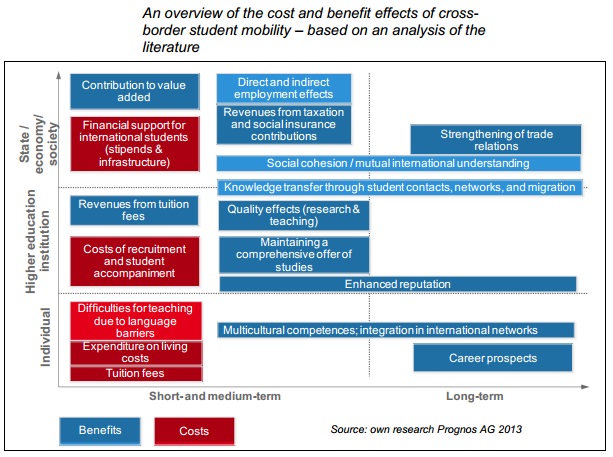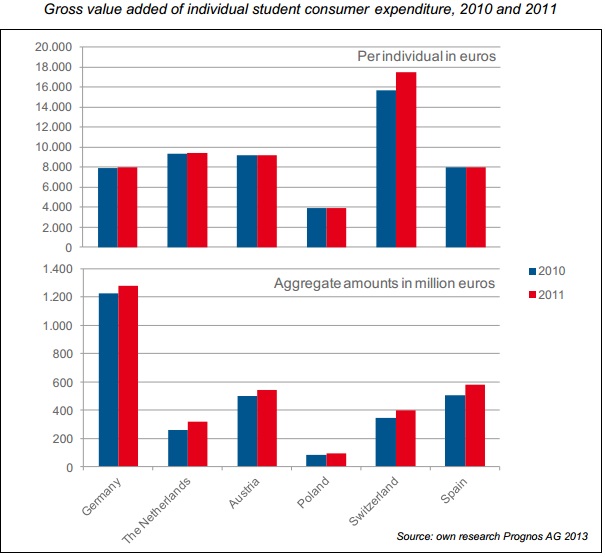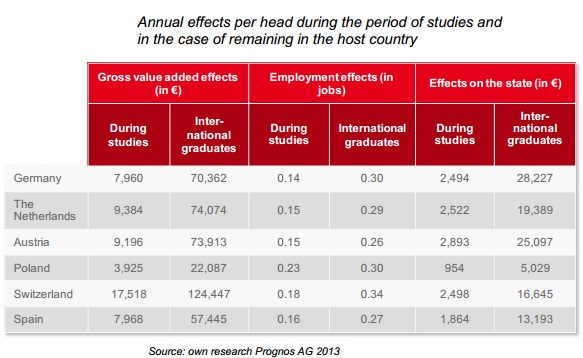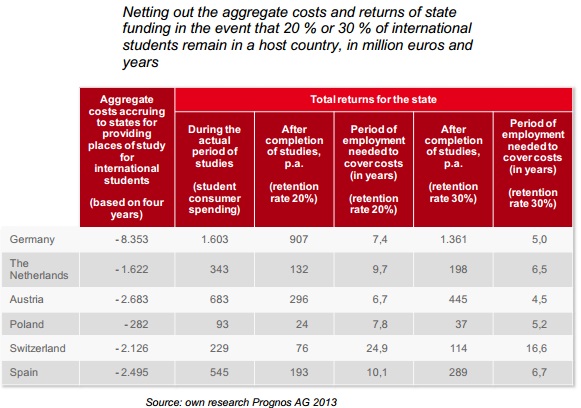International students pay off

Countries benefit significantly from value creation resulting from student mobility. However, international students do not pay off immediately, it depends on the study costs, the place of study and the percentage of students that stay after their study and find a job. Yet, the country’s economy benefits directly from an increased consumer spending, researchers from the German Academic Exchange Service and Prognos concluded in the report “The Financial Impact of Cross-Border Student Mobility on the Economy of the Host Country”. Besides Germany, the researchers studied the Netherlands, Austria, Poland, Switzerland and Spain.
On top of these economics effects, there are other effects that are harder to express in economic terms. Increased student mobility boosts cross-border knowledge, benefitting both countries. Student also acquire multicultural competences which on the level of the individual are valuable for future careers, and on the societal level contribute towards understanding and breaking down prejudices between peoples. “Moreover, cross-border student mobility facilitates the formation of international networks, which can in the long term lead to intensified economic relations among participating countries,” the researchers state.

Host countries benefit
“The surge of international student mobility induces effects not only at the individual level of the students concerned but also on the societal, financial, and economic development of the involved host countries. On the one hand, host countries have to provide places of study, accommodation and advisory services for the international students at their higher education institutions. On the other hand, they stand to benefit from their presence, for example as result of their expenditure.”
A recent study by the Netherlands Bureau of Economic Policy Analysis investigated the short- and long-term effects of international student mobility on public finances in the Netherlands. Although the presence of international students costs tax money, it was concluded that these costs are later offset by tax revenues when international graduates stay in the country.
More than a billion euros
“The macro-economic effects on value creation and employment depend on the amounts international students have to spend to cover their living expenses. In Switzerland, due to the high living costs there, students spend around 19,500 euros per year. The cost of living is lowest in Poland, where student expenditure amounts to 4,800 euros. In the other researched countries, the money students spend on accommodation and consumption ranges from 9,000 euros in Spain, to 11,400 euros in the Netherlands.”
International students in Germany add around 8,000 euros per head to the economy. The effect per individual is similar in the Netherlands, Austria, and Spain. In Switzerland the gross value added per student is even 17,500 euros, and in Poland it is 3,900 euros.
“The aggregate value added contribution of international students in a host country is calculated by multiplying the above amounts by the number of international students. The aggregate amount is highest in Germany, at 1.28 billion euros. In 2011, in Germany the taxation effects of student expenditure amounted to around 2,500 euros per individual. Projected over the aggregate number of students, this amounted to some 400 million euros.”

As higher education institutes in the researched countries are mainly state funded, these costs accumulate at the level of the state. State expenditure per place of study varies between 2,900 euros in Poland and 22,500 euros in Switzerland. At around 11,900 euros, Germany is mid-field. Austria and the Netherlands, at 11,200 euros and 10,500 euros respectively, have similarly high state expenditure. In Spain the state expenditure on higher education funding is lower, at around 8,000 euros.
Repaid in five years
Hosting international students has positive economic effects. These are caused by the creation of gross value added, job creation, and revenues accruing to the state. The following table shows the effect per individual student during the period of actual studies as well as for the case of international graduates who stay in the host country.

“As the expected yields from investment in education are only realized over the longer term, it would be inappropriate to attempt any definitive assessment of the effects on such a short-term basis. However, over the longer term there is a clear increase in the macro-economic returns. The annual level of long-term returns depends entirely on the number of international students who, once they have graduated, choose to remain in a host country and pursue gainful employment.”
Thus, the proportion of international students who choose to remain in a host country also determines the period necessary to repay the investment a host country makes when providing places of study. In the event that 30 percent of the international students stay in Germany after their study, the debt would be repaid in a period of five years. In Switzerland, on the other hand, the costs would only be covered after a period of around 17 years, because of the combination of high costs for providing places of study and the low tax rates in Switzerland.

Meest Gelezen
Vrouwen houden universiteit draaiende, maar krijgen daarvoor geen waardering
Hbo-docent wil wel rolmodel zijn, maar niet eigen moreel kompas opdringen
Wederom intimidatie van journalisten door universiteit, nu in Delft
‘Waarom het nu niet lukt om medezeggenschap in hbo te versterken’
‘Sluijsmans et al. slaan de plank volledig mis’

